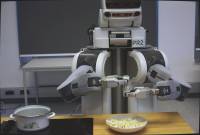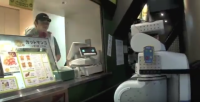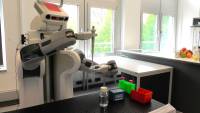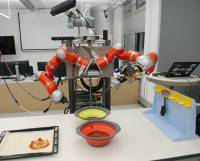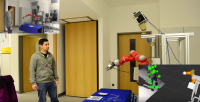This is an old revision of the document!
Table of Contents
EASE@ROBOCUP 2018 TEAM WEBPAGE
Team Description
Institute for Artificial Intelligence (IAI) directed by Prof. Beetz has its roots from the Intelligent Autonomous Systems Group (IAS) at Technische Universitaet Muenchen where he was previously affiliated with. Starting from 2006 as IAS and now as IAI, the group has been one of the leading research laboratories in the field of cognition-enabled robot control. Towards bringing robots into humans' life, the group has already shown significant robotic demonstrations such as making popcorn, preparing Baverian breakfast, baking pizza and buying sandwiches from a restaurant.
All these robotic demonstrations are ones of their kinds and grab a lot of attention from state-wide, nation-wide, and global media including a MIT Tech Review article. As the group reaches leading-edge results and accomplishes these demonstrations, it has been always one of its main goal to reveal its research not just publishing scientific articles but also in the means of open-source software and robotic experiment data.
By having this goal, the group has already initiated and contributed several open-source software projects including Point Cloud Library (PCL) as the standard platform for 3D perception in robotics research, RoboSherlock as a common framework for cognitive perception, KnowRob as a knowledge representation and reasoning system with a strong emphasis on household domain and Cognitive Robot Abstract Machine (CRAM) as a software toolbox for the design, implementation and deployment of cognition-enabled plan execution on autonomous robots.
For revealing data generated by the experiments, the group uses its openEASE platform in which robots and researchers can connect to ask queries in Prolog syntax about episodes of experiments such as what the robots did, why, how, what happened, and what they saw. Furthermore, the group has also published its human-tracking data which is designated for robot learning in [5].
With all these efforts for open-research, the group has already been awarded an iCub humanoid platform from the European Commission and a PR2 personal robot platform from Willow Garage Beta Program for the integration of the aforementioned software to these robotic platforms.
In 2018, the group aims to attend to RoboCup@Home SPL with Toyota Human Support Robot using a a knowledge-extensive, plan-based approach that is capable of fulfilling household tasks.
Team Members
and 3 selected M.Sc. and B.Sc. students from Computer Science Department that will be announced later.
Robotic Demonstrations
Publications
1)Moritz Tenorth, Michael Beetz, “KnowRob – A Knowledge Processing Infrastructure for Cognition-enabled Robots”, In Int. Journal of Robotics Research, vol. 32, no. 5, pp. 566 - 590, 2013.
2) Michael Beetz, Moritz Tenorth, Jan Winkler, “Open-EASE – A Knowledge Processing Service for Robots and Robotics/AI Researchers”, In IEEE International Conference on Robotics and Automation (ICRA), Seattle, Washington, USA, 2015. Finalist for the Best Cognitive Robotics Paper Award.
3) Michael Beetz, Ferenc Bálint-Benczédi, Nico Blodow, Christian Kerl, Zoltán-Csaba Márton, Daniel Nyga, Florian Seidel, Thiemo Wiedemeyer, Jan-Hendrik Worch, “RoboSherlock: Unstructured Information Processing Framework for Robotic Perception”, In Handling Uncertainty and Networked Structure in Robot Control, Springer International Publishing, Cham, pp. 181-208, 2015.
4) Michael Beetz, Lorenz Mösenlechner, Moritz Tenorth, Thomas Rühr, “CRAM – a Cognitive Robot Abstract Machine”, In 5th International Conference on Cognitive Systems (CogSys 2012), 2012.
5) Moritz Tenorth, Jan Bandouch, Michael Beetz, “The TUM Kitchen Data Set of Everyday Manipulation Activities for Motion Tracking and Action Recognition”, In IEEE International Workshop on Tracking Humans for the Evaluation of their Motion in Image Sequences (THEMIS), in conjunction with ICCV2009, 2009.

